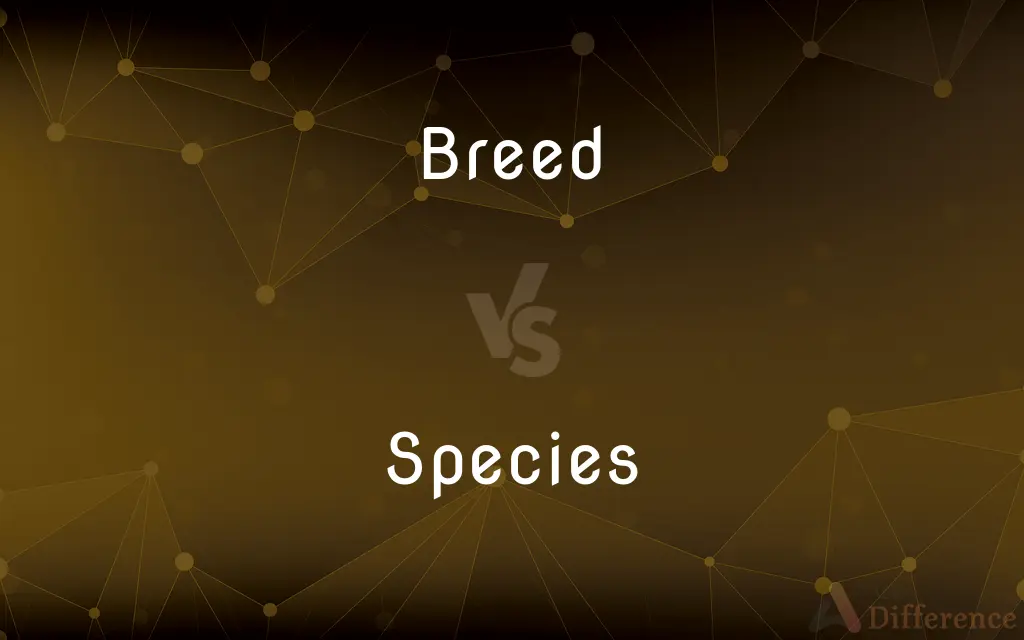Breed vs. Species — What's the Difference?
By Urooj Arif & Fiza Rafique — Updated on April 15, 2024
A breed is a specific group within a species that has been selectively bred to exhibit particular traits, seen in domestic animals like dogs and cats. Species represents a group of organisms capable of interbreeding and producing fertile offspring.

Difference Between Breed and Species
Table of Contents
ADVERTISEMENT
Key Differences
A breed is a subdivision within a species, specifically defined by artificially selected traits such as appearance, behavior, and other characteristics desired by humans. This concept is most commonly applied to domestic animals like dogs, cats, and livestock. In contrast, a species is a fundamental biological classification, a group of living organisms consisting of similar individuals capable of exchanging genes or interbreeding.
Breeds are human-defined and created for specific purposes, such as work, companionship, or show. Each breed has standards set by human societies, like kennel clubs, which determine what characteristics make up a breed. On the other hand, the concept of a species is defined by biology and natural processes, often differentiated by genetic differences and reproductive isolation from other groups.
The creation of a breed often involves selective breeding over many generations to emphasize desirable traits. While breeds can vary widely in appearance and behavior within the same species, members of the same species, regardless of their breed, can generally interbreed and produce fertile offspring. This is fundamentally different from species differentiation, where reproductive barriers prevent different species from producing fertile offspring.
Breeds can be thought of as human-induced diversity within a species, whereas species diversity is a result of natural evolutionary processes, influenced by factors such as geographic isolation, environmental change, and genetic drift. This natural diversity is what contributes to the ecological variety and biological niches we observe in nature.
The term "breed" is primarily used in relation to domesticated animals, and it's a reflection of human preferences and manipulations. The term "species," however, is used across all living organisms, from the smallest bacteria to plants, animals, and humans, reflecting a much broader, scientifically defined spectrum of life.
ADVERTISEMENT
Comparison Chart
Definition
A group within a species selected for specific traits
A group capable of breeding and producing fertile offspring
Application
Mainly domestic animals
All living organisms
Basis of Differentiation
Human selection for traits
Natural reproductive capabilities and genetic makeup
Purpose
Specific human uses (companionship, work, etc.)
Classification and understanding of biodiversity
Example
Different dog breeds like Labrador Retriever or German Shepherd
Different species such as Canis lupus (wolves) and Canis lupus familiaris (domestic dogs)
Compare with Definitions
Breed
Recognized by particular standards in physical traits and behavior.
The Siamese cat breed is distinguished by its blue almond-shaped eyes and short coat.
Species
A basic unit of biological classification and a taxonomic rank.
The human species is scientifically known as Homo sapiens.
Breed
Developed for specific roles such as herding, hunting, or companionship.
The Persian breed of cats is popular for its docile and quiet nature, making it a favored companion pet.
Species
Can be further divided into subspecies, varieties, and breeds.
The Galápagos tortoises encompass several species, each adapted to life on different islands of the archipelago.
Breed
Managed by breed registries and associations that maintain breed standards.
The American Kennel Club regulates dog breed standards in the U.S.
Species
Defined by the ability to reproduce and produce fertile offspring naturally.
Tigers and lions, although similar, are different species as their hybrids (ligers and tigons) are typically infertile.
Breed
A specific group of domestic animals with similar characteristics bred by humans.
The Border Collie breed is known for its intelligence and agility, making it excellent for herding.
Species
Exhibits common characteristics and genetic makeup which differentiate it from other species.
The species Rosa indica, known for its distinctive flowers, is one of the many species of roses.
Breed
Can interbreed within the same species to produce fertile offspring.
A Labrador Retriever and a Poodle can interbreed to produce Labradoodles, which are a hybrid breed.
Species
Is a measure of biodiversity, reflecting the evolutionary processes over millennia.
The diversity of finch species in the Galápagos Islands illustrates adaptive radiation—a process where species evolve from a common ancestor to occupy various ecological niches.
Breed
A breed is a specific group of domestic animals having homogeneous appearance (phenotype), homogeneous behavior, and/or other characteristics that distinguish it from other organisms of the same species. In literature, there exist several slightly deviating definitions.
Species
A group of living organisms consisting of similar individuals capable of exchanging genes or interbreeding. The species is the principal natural taxonomic unit, ranking below a genus and denoted by a Latin binomial, e.g. Homo sapiens.
Breed
To produce (offspring); give birth to or hatch.
Species
A kind or sort
A species of invective at once tough and suave
Breed
To bring about; engender
"Admission of guilt tends to breed public sympathy" (Jonathan Alter).
Species
The visible form of each of the elements of consecrated bread and wine in the Eucharist.
Breed
To cause to reproduce, especially by controlled mating and selection
Breed cattle.
Species
(Biology) A group of closely related organisms that are very similar to each other and are usually capable of interbreeding and producing fertile offspring. The species is the fundamental category of taxonomic classification, ranking below a genus or subgenus. Species names are represented in binomial nomenclature by an uncapitalized Latin adjective or noun following a capitalized genus name, as in Ananas comosus, the pineapple, and Equus caballus, the horse.
Breed
To develop new or improved strains in (organisms), chiefly through controlled mating and selection of offspring for desirable traits.
Species
(Logic) A class of individuals or objects grouped by virtue of their common attributes and assigned a common name; a division subordinate to a genus.
Breed
To inseminate or impregnate; mate with.
Species
(Chemistry) A set of atoms, molecules, ions, or other chemical entities that possess the same distinct characteristics with respect to a chemical process or measurement.
Breed
To rear or train; bring up
A writer who was bred in a seafaring culture.
Species
A kind, variety, or type
"No species of performing artist is as self-critical as a dancer" (Susan Sontag).
Breed
To be the place of origin of
Austria breeds great skiers.
Species
The outward appearance or form of the Eucharistic elements that is retained after their consecration.
Breed
To produce (fissionable material) in a breeder reactor.
Species
Either of the consecrated elements of the Eucharist.
Breed
To produce offspring.
Species
Type or kind. race.}}
The male species
A new species of war
Breed
To copulate; mate.
Species
A group of plants or animals having similar appearance.
This species of animal is unique to the area.
Breed
To originate and develop
Mischief breeds in bored minds.
Species
A category in the classification of organisms, ranking below genus; a taxon at that rank.
Breed
A group of organisms having common ancestors and certain distinguishable characteristics, especially a group within a species developed by artificial selection and maintained by controlled propagation.
Species
A particular type of atom, molecule, ion or other particle.
Breed
A kind; a sort
A new breed of politician.
A new breed of computer.
Species
(mineralogy) A mineral with a unique chemical formula whose crystals belong to a unique crystallographic system.
Breed
(Offensive) A person of mixed racial descent; a half-breed.
Species
An image, an appearance, a spectacle.
Breed
(transitive) To give birth to; to be the native place of.
A pond breeds fish; a northern country breeds stout men
Species
(obsolete) The image of something cast on a surface, or reflected from a surface, or refracted through a lens or telescope; a reflection.
I cast the species of the Sun onto a sheet of paper through a telescope.
Breed
Of animals, to mate.
Species
Visible or perceptible presentation; appearance; something perceived.
Breed
To keep animals and have them reproduce in a way that improves the next generation’s qualities.
Species
(Christianity) Either of the two elements of the Eucharist after they have been consecrated.
Breed
To arrange the mating of specific animals.
She wanted to breed her cow to the neighbor's registered bull.
Species
Coin, or coined silver, gold, or other metal, used as a circulating medium; specie.
Breed
To propagate or grow plants trying to give them certain qualities.
He tries to breed blue roses.
Species
A component part of compound medicine; a simple.
Breed
To take care of in infancy and through childhood; to bring up.
Species
Plural of specie
Breed
To yield or result in.
Disaster breeds famine;
Familiarity breeds contempt
Species
Visible or sensible presentation; appearance; a sensible percept received by the imagination; an image.
Wit, . . . the faculty of imagination in the writer, which searches over all the memory for the species or ideas of those things which it designs to represent.
Breed
To be formed in the parent or dam; to be generated, or to grow, like young before birth.
Species
A group of individuals agreeing in common attributes, and designated by a common name; a conception subordinated to another conception, called a genus, or generic conception, from which it differs in containing or comprehending more attributes, and extending to fewer individuals. Thus, man is a species, under animal as a genus; and man, in its turn, may be regarded as a genus with respect to European, American, or the like, as species.
Breed
(sometimes as breed up) To educate; to instruct; to bring up
Species
In science, a more or less permanent group of existing things or beings, associated according to attributes, or properties determined by scientific observation.
Breed
To produce or obtain by any natural process.
Species
A sort; a kind; a variety; as, a species of low cunning; a species of generosity; a species of cloth.
Breed
(intransitive) To have birth; to be produced, developed or multiplied.
Species
Coin, or coined silver, gold, or other metal, used as a circulating medium; specie.
There was, in the splendor of the Roman empire, a less quantity of current species in Europe than there is now.
Breed
(transitive) to ejaculate inside someone's anus
Species
A public spectacle or exhibition.
Breed
All animals or plants of the same species or subspecies.
A breed of tulip
A breed of animal
Species
A component part of a compound medicine; a simple.
Breed
A race or lineage; offspring or issue.
Species
The form or shape given to materials; fashion or shape; form; figure.
Breed
(informal) A group of people with shared characteristics.
People who were taught classical Greek and Latin at school are a dying breed.
Species
(biology) taxonomic group whose members can interbreed
Breed
To produce as offspring; to bring forth; to bear; to procreate; to generate; to beget; to hatch.
Yet every mother breeds not sons alike.
If the sun breed maggots in a dead dog.
Species
A specific kind of something;
A species of molecule
A species of villainy
Breed
To take care of in infancy, and through the age of youth; to bring up; to nurse and foster.
To bring thee forth with pain, with care to breed.
Born and bred on the verge of the wilderness.
Breed
To educate; to instruct; to form by education; to train; - sometimes followed by up.
But no care was taken to breed him a Protestant.
His farm may not remove his children too far from him, or the trade he breeds them up in.
Breed
To engender; to cause; to occasion; to originate; to produce; as, to breed a storm; to breed disease.
Lest the placeAnd my quaint habits breed astonishment.
Breed
To give birth to; to be the native place of; as, a pond breeds fish; a northern country breeds stout men.
Breed
To raise, as any kind of stock.
Breed
To produce or obtain by any natural process.
Children would breed their teeth with less danger.
Breed
To bear and nourish young; to reproduce or multiply itself; to be pregnant.
That they breed abundantly in the earth.
The mother had never bred before.
Ant. Is your gold and silver ewes and rams?Shy. I can not tell. I make it breed as fast.
Breed
To be formed in the parent or dam; to be generated, or to grow, as young before birth.
Breed
To have birth; to be produced or multiplied.
Heavens rain graceOn that which breeds between them.
Breed
To raise a breed; to get progeny.
The kind of animal which you wish to breed from.
Breed
A race or variety of men or other animals (or of plants), perpetuating its special or distinctive characteristics by inheritance.
Twice fifteen thousand hearts of England's breed.
Greyhounds of the best breed.
Breed
Class; sort; kind; - of men, things, or qualities.
Are these the breed of wits so wondered at?
This courtesy is not of the right breed.
Breed
A number produced at once; a brood.
Breed
A special lineage;
A breed of Americans
Breed
A special variety of domesticated animals within a species;
He experimented on a particular breed of white rats
He created a new strain of sheep
Breed
Half-caste offspring of parents of different races (especially of white and Indian parents)
Breed
A lineage or race of people
Breed
Call forth
Breed
Copulate with a female, used especially of horses;
The horse covers the mare
Breed
Of plants or animals;
She breeds dogs
Breed
Have young (animals);
Pandas rarely breed in captivity
Common Curiosities
Can different breeds become different species?
Typically, breeds do not become different species as they remain capable of interbreeding and producing fertile offspring within their species.
Why are breed distinctions important?
Breed distinctions help in specific roles like herding, hunting, companionship, and also in competitive events like dog shows.
How does the concept of a species help in biological research?
The concept of a species provides a framework for biologists to study evolution, ecology, and behavior. It helps in categorizing organisms in a way that reflects evolutionary relationships and ecological roles, facilitating comparisons and research across different areas of biology.
What is the main difference between a breed and a species?
A breed is a selective breeding result within a species for certain traits, while a species is a natural grouping based on reproductive isolation and genetic distinctiveness.
How do scientists determine when organisms belong to different species?
Scientists use criteria such as reproductive isolation, genetic differences, and sometimes geographic separation to classify organisms as different species.
How does artificial selection affect the health of a breed?
Artificial selection can lead to health issues in breeds due to limited genetic diversity and the propagation of deleterious traits, underscoring the need for responsible breeding practices.
Can breeds be found in wild animals?
Generally, the concept of breeds applies to domesticated animals. Wild animal variations are more often referred to as subspecies or variants, not breeds.
What impact does the classification of breeds and species have on conservation?
Understanding and classifying breeds and species aids in biodiversity conservation efforts, allowing for targeted protection and breeding programs that preserve genetic diversity and ecological balance.
Are there any ethical considerations in creating new breeds?
Yes, ethical considerations in breeding include the potential for genetic disorders due to inbreeding, the welfare of the animals involved, and the implications of creating breeds with extreme physical traits that may affect their health and quality of life.
What are examples of how breeds have been created?
Breeds have been created through selective breeding, where humans choose specific animals with desirable traits to reproduce, over many generations. For example, different dog breeds have been developed for various tasks like hunting, guarding, or companionship.
What role do species play in ecosystem dynamics?
Each species plays a specific role in its ecosystem, contributing to energy flow and nutrient cycling. Species diversity ensures ecosystem resilience, allowing it to maintain function and provide ecosystem services even when conditions change.
Can the distinction between breeds and species inform animal welfare practices?
Yes, understanding the distinctions can guide better management practices tailored to the specific needs of different breeds and species, improving health, welfare, and conservation efforts.
Share Your Discovery

Previous Comparison
Fable vs. Parable
Next Comparison
Bourbon vs. WhiskeyAuthor Spotlight
Written by
Urooj ArifUrooj is a skilled content writer at Ask Difference, known for her exceptional ability to simplify complex topics into engaging and informative content. With a passion for research and a flair for clear, concise writing, she consistently delivers articles that resonate with our diverse audience.
Co-written by
Fiza RafiqueFiza Rafique is a skilled content writer at AskDifference.com, where she meticulously refines and enhances written pieces. Drawing from her vast editorial expertise, Fiza ensures clarity, accuracy, and precision in every article. Passionate about language, she continually seeks to elevate the quality of content for readers worldwide.














































